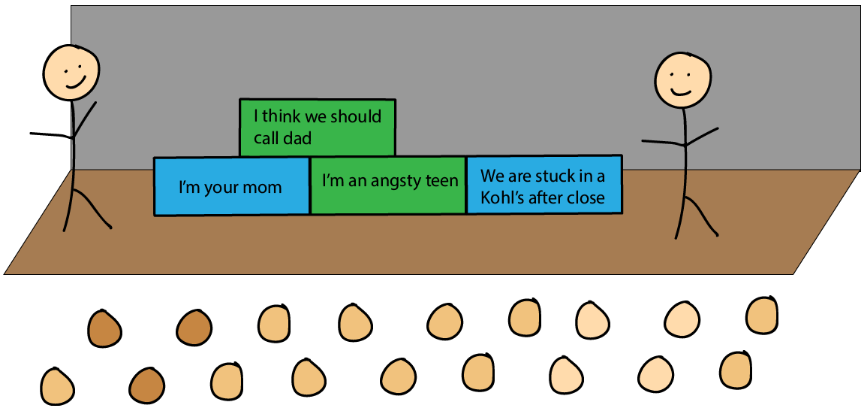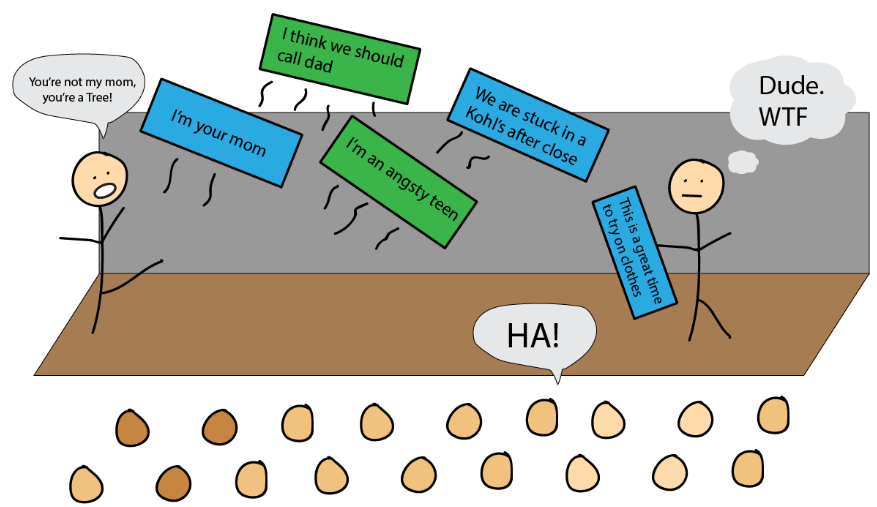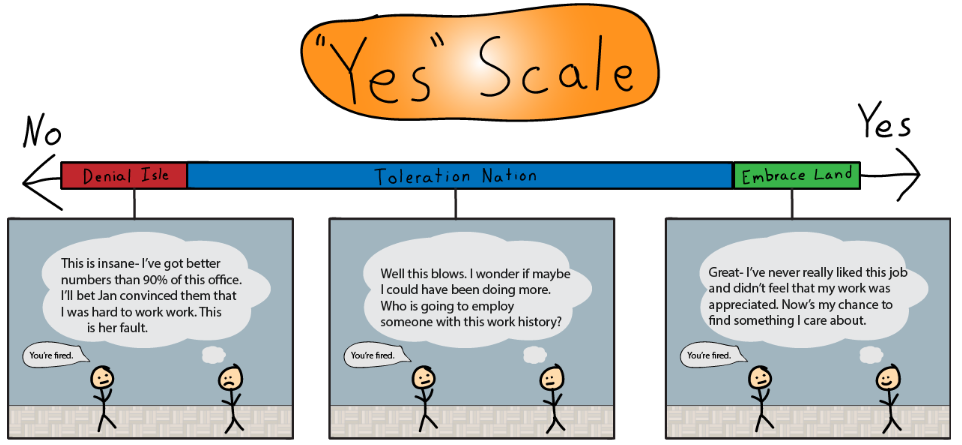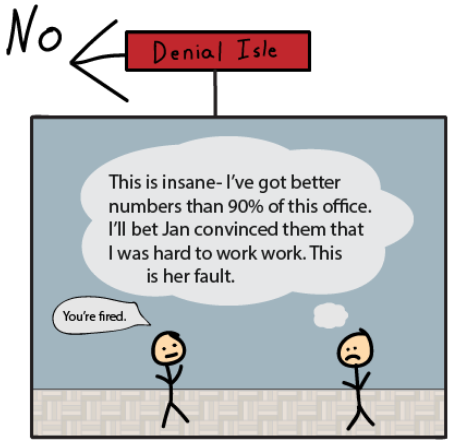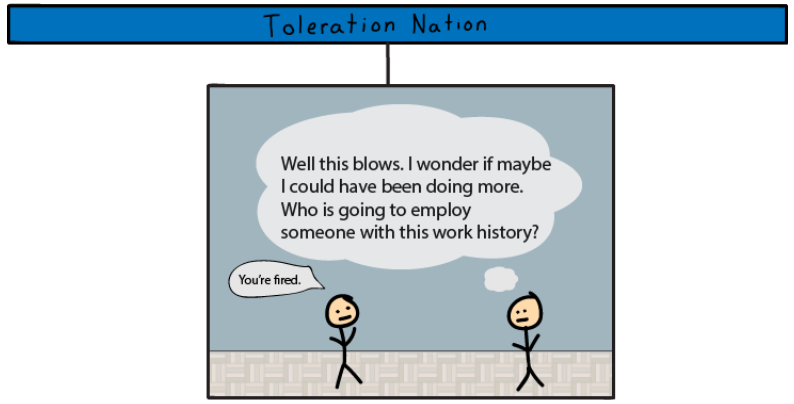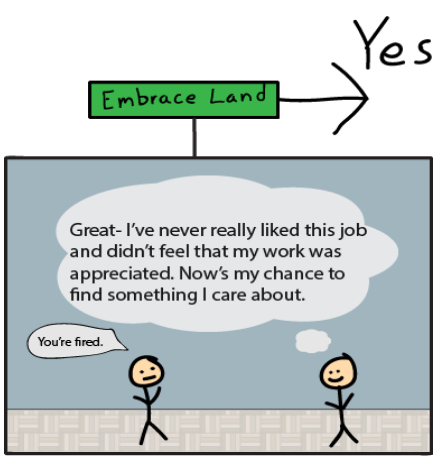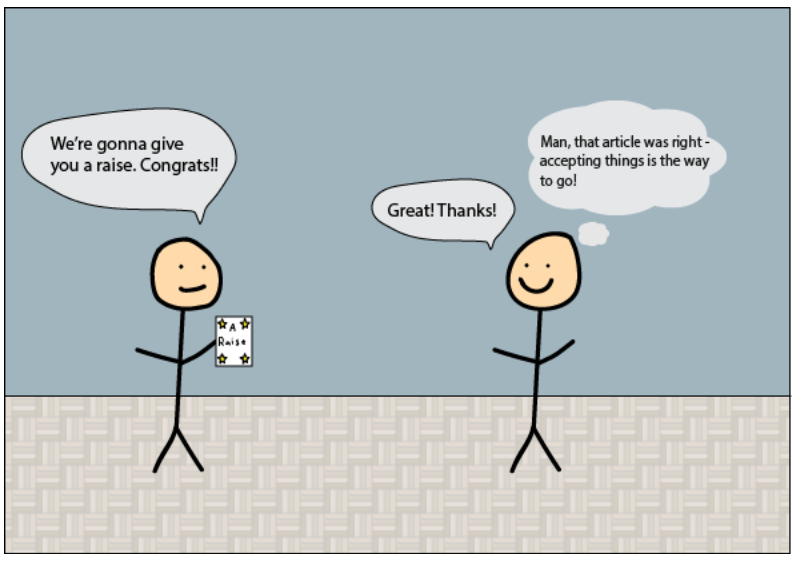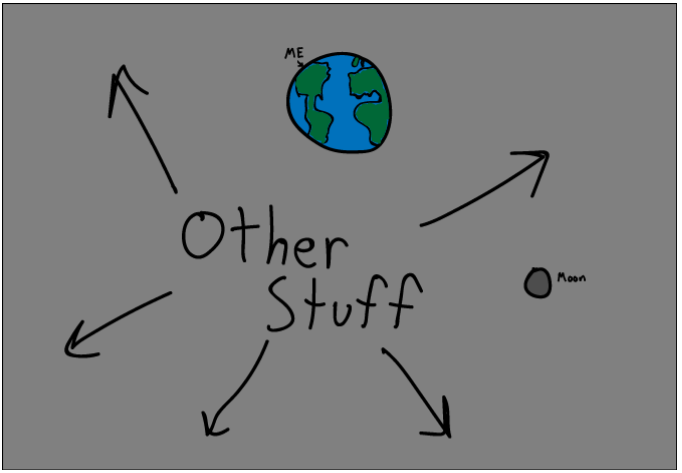Embracing Opportunity
What Improv Comedians, Ancient Stoics, and Navy Seals have in common
(hint: it’s not their workout regime)
Let’s Make Sandals
“Where would there be leather enough to cover the entire world? With just the leather of my sandals, it is as if the whole world were covered. Likewise, I am unable to restrain external phenomena, but I shall restrain my own mind. What need is there to restrain anything else?”
– Shantideva
Every single day, we unknowingly place our personal well-being into the hands of fate. This is a terrible idea because the outside world is pretty unpredictable, and it can be really shitty at times. It seems crazy that someone would leave their own happiness outside of their control until you look around and realize that we all do this all the time. We are constantly depending on external circumstances to go well in order for us to perform at our best, be happy, get a better job, find love, etc. The fact is, life is complicated and is filled with challenges, dread, surprises, and failures. But, there’s a key feature of being you that allows you to persevere, grow, innovate, and move forward through anything life can throw at you. You have complete control over what you think, say, and do as a reaction to those events.
A better understanding of how you react to situations will transform your life from one that is dependent on things going your way into one that leads to productive actions being taken regardless of what happens. We can learn how to embrace everything that happens to us, how to say yes to offers made by the world around us, and how to find the good in every situation. We don’t need to depend on perfect circumstances to succeed. Unfortunately for us, the perfect world isn’t happening anytime soon.In the quote above, Shantideva discusses how it makes more sense to cover our own feet with leather for protection, rather than relying on the ability to control the entire world’s floor around us. It’s not the ground that needs changing – it’s how we respond to the ground. Just like we can make sandals, we can learn how to respond when bad things happen. To start learning how to make our own sandals, let’s draw from the world of improv for inspiration.
Don’t Worry – This Section is Short and Has Pictures
Improvisational theater (often referred to as just “improv”) is a form of live theater in which the plot, characters, and dialogue of scenes are made up in the moment by a group of improvisers on stage. In the world of improv, there’s a common phrase or rule of thumb that gets thrown around quite often. In fact, it’s been used so much that you may have even heard it before: “Yes, And”. Students are taught this phrase to learn how to both agree with the information that has been laid out by his or her scene partner (“Yes”) and to add more information on top of it (“And”). It’s the very basis for how we go from nothing to something in an improv scene; you add a brick of information to the reality that we are building together, and I will agree with the brick you have chosen. I can then lay my own, unique brick down to build off of yours. It’s kind of like this:
Let’s call each of these bricks an offer. When you say no to the offer laid out by your scene partner, this is called a denial. Denials can spark a sudden jolt of excitement resulting in a quick laugh from the audience, but this excitement is short-lived as the denial has now ruined everything that had been built up to that point in the scene.
Improvisers quickly learn to not be the guy kicking bricks because that guy doesn’t have friends. Although denials may be obvious, agreement is not the binary choice that it appears to be of either denying offers or saying yes to them. There is a whole spectrum of choices and varying amounts of agreement you can apply. Often times improvisers think they’re saying yes when they’re really just not saying no - they’re tolerating what is offered to them.
“Why Should I Care?” Section (or, “What’s in it for me?”)
Let’s extend this idea more broadly to everyday life because offers aren’t just happening in improv – they happen to all of us. A real-life “offer” is anything that is not completely within your control, and every one of us has countless offers being made to us every day. Your alarm didn’t go off this morning; your wife had coffee waiting for you in the kitchen; traffic is worse than usual; you got a new client; you got fired; this list goes on. These are situations in which you hold varying degrees of influence over – yet, since they are not completely within your control, they are offers.
To better understand what an offer looks like, let’s look at a common example – the grade you receive on a test. You may assume that the grade received is completely within your control, but this isn’t true. Of course, there are many ways for you to influence the grade with how much time you put into studying, how early you decide to go to bed the night before, whether you decide to show up or not – all things within your control. However, the grade that you receive also has many outside influences – the accuracy of the study material you read, your kids inability to let you choose your own bedtime, the professor’s decision to curve the grades. The list can go on. Therefore, the grade received is not in and of itself completely within your control – thus, it is an offer.
Each moment of every day you have a choice; to either embrace these offers in a way that lends itself to a productive action being taken or to tolerate the offers happening to you. Because how much you embrace your reality is completely within your control.
The degree of “yes” you decide to respond to these offers with will greatly shape the quality of your life – much like it shapes the quality of an improv scene.
Let’s explore the spectrum of choices and degrees of “Yes” in more detail in my completely made up “Yes” Scale below:
All three of the examples above include the same offer being made: getting fired. The only difference is how much agreement was applied. How much you embrace your reality is completely within your control. Let’s dive into each category in more detail.
I’ve already talked briefly about denying offers in life - we’ll call this part of the scale Denial Isle. This is where the brick-kickers reside - thankfully, this not a well-populated place. When in Denial Isle, you believe that offers, both good and bad, say something about you and who you are as a person. If something good happens to you, it’s because you are the smartest and hardest working person (duh). But, when something bad happens, that doesn’t agree with the previously solidified truth that you are the smartest and hardest working person. And you don’t like that very much. So, instead of accepting what has happened, you must complain, make excuses, point fingers, and argue with the results.
Whenever you are feeling frustrated or irritated, check your surroundings – you might just be in Denial Isle. You’ll know because you’ll see bricks flying everywhere. It’s like that saying: if all the people you run into all day are assholes, then you’re probably the asshole. If events and people keep causing you frustrations all day, the issue probably isn’t in those things themselves (offers), it’s probably in the perspective of the person receiving the offers. Of course, there’s a practical reason for not wanting to be in Denial Isle; you can’t look forward because you’re still in the past disputing what is already done. You’re also concerned with what your expectations said “should” or “could” be the reality instead of perceiving what truly is. No amount of dwelling or whining will change what is.
“There is nothing either good or bad but thinking makes it so.” – Unknown … to me for a while. Turns out it’s Shakespeare.
Toleration Nation is by far the most populated location as it’s filled with varying degrees of denial and acceptance, resulting in tolerating offers made to you. This is a much better place to be than Denial Isle, as you’re no longer shooting down offers made by others and are instead going along with what happens. The problem with Toleration Nation is that it’s quite deceptive in its nature. These people aren’t saying no, but they aren’t really saying yes either - they’re simply tolerating what is offered to them. Because of this confusion, lost souls wander through the middle of the scale oblivious to the potential just ahead of them.
The tolerating creates a false sense of reality that makes you believe that you are doing everything you can to be happier and more productive and it is, unfortunately, the low-quality individuals and situations (offers) around you that are the source of struggles in your life. And, since you made it through a day without punching someone, you should be given an award for tolerating such offers. This is still different from Denial Isle – you’re not blatantly rejecting what happens to you and throwing hissy fits. Yet, there are still constant what-ifs and disputes of the past, which makes you unaware of what is possible outside of Toleration Nation.
“A good person dyes events with his own color … and turns whatever happens to his own benefit.” – Seneca (One of those stoic dudes)
At the far right of the scale, you can see what encompasses a full “Yes” on the agreement scale. Individuals in Embrace Land are embracing what happens to them in an excited, supportive way. Loving the offer that was made to them - this is what Embrace Land is all about. In Embrace Land, you understand that offers do not determine who you are as an individual; rather, your reaction and response to the offer is what determines both the quality of your life and the result going forward. This thought process is often referred to as a growth mindset. The cool thing about this mindset is that it’s the one science agrees with. You are not a fixed person incapable of changing and growing. Any failure is seen for what it truly is – a learning experience.
The mentality in Embrace Land lends itself towards action. I can already see that person fired excitedly looking through job listings, calling friends, and updating his or her resume. Not only do you accept what happens to you, but you also believe it is a good thing it even happened. Everything is good. Simply tolerating offers and embracing them are vastly different, and in life it makes a huge difference.
It’s important to note here that acceptance does not mean resignation. To embrace an offer for what it is does not indicate that you want things to continue to be that way in the future. If you wish to have things change for the better, this requires action. The most effective way to change things is to both see and accept where you are now – embracing what currently is. This lets you look forward and not unproductively backward. To accept that you’ve been fired does not mean that you wish to continue to be jobless – it means that you won’t dwell on the fact that you were fired. Instead, you’ll accept the lesson and move forward with enthusiasm. Because you’ve got a life to go live, dammit.
“Just as nature takes every obstacle, every impediment, and works around it – turns it to its purposes, incorporates it into itself – so, too, a rational being can turn each setback into raw material and use it to achieve its goal.” – Marcus Aurelius
(Another stoic. These guys are everywhere.)
Similar to good improv offers, it’s easy to embrace good things in life:
What’s harder is really leaning into the failures, obstacles, and problems you face every day. Focusing on what a bummer it is that (insert problem here) happened? All that comes from this is the idea that you’re unlucky, life’s not fair, or you’ve been discovered for the fraud that you really are. Deciding to shift your focus to a new opportunity because (insert problem here) happened? That’s how individuals and companies innovate – how they “pivot”. They turn a constraint into an opportunity.
Don’t work on tolerating what happens to you. Embrace what happens to you. Don’t look for the good in a situation. Define the good in a situation.
Section Where I Tell You I’m Not Original
Don’t want to believe a guy who makes shit up for a living? Believe it or not, I’m not the first to find the importance of embracing what happens to you in an enthusiastic way. The ancient Stoics had terms a bit more elegant-sounding than Toleration Nation or Embrace Land (as good as those are. I mean one of them rhymes, and the other sounds like Graceland. Cool, right? Somebody love me.)
The Art of Acquiescence – When the cause of the problem lies outside of us, we are better for accepting it and moving on.
The Art of Acquiescence is the best parts of Toleration Nation. When you are just to the left of Embrace Land, you are accepting offers and moving forward. But even the Stoics knew that there was a higher form of acceptance available to us all.
Amori fati – a love of fate.
“My formula for greatness in a human being is amor fati: that one wants nothing to be different, not forward, not backward, not in all eternity. Not merely bear what is necessary, still less conceal it… but love it.” – Nietzsche (Not a Stoic but great quote, yeah?)
The Stoics would command themselves: cheerfulness in all situations – especially the bad ones. I once met a man who told everyone willing to listen “today is the best day ever.” Every. Single. Day. It didn’t matter what was going on or when you crossed paths with him; he would proclaim this and truly mean it. That is a man cheerful in all situations; a permanent resident of Embrace Land. Someone who loves what happens to him. A modern day stoic – someone we can all aspire to be like.
Ryan Holiday, author of The Obstacle is the Way, summarizes it all nicely:
“Discard our expectations and accept what happens to us, understand that certain things – particularly bad things – are outside our control, then love whatever happens to us and face it with unfailing cheerfulness.
It is the act of turning what we must do into what we get to do.”
As another example, meet intensity distilled into human form: Jocko Willink. Jocko is a former Navy Seal officer who stresses the importance of discipline and leadership learned from his time serving in the military. Again, surprisingly, he doesn’t use the same phrases I do to describe one’s reactions to offers, but his philosophy is still the same. For Jocko, it comes down to one word and the entire mentality it instills: “Good”. When faced with any situation or hardship, he says aloud to himself “Good”. He believes that when things are going bad, there is always going to be some good that comes from it.
As he says on his podcast:
“Oh, the mission got canceled? Good… We can focus on another one.
Got beat? Good… We learned.
Unexpected problems? Good… We have to figure out a solution
That’s it. When things are going bad: Don’t get all bummed out, don’t get startled, don’t get frustrated. No. Just look at the issue and say: “Good.”
Dwelling on the problem won’t solve the issue. No. Accept reality, but focus on the solution. Take that issue, take that setback, take that problem, and turn it into something good. Go forward.”
– Jocko Willink (Embrace Land resident)
Bring it Together Now
I get how crazy this can seem sometimes:
But really – what other choice do we have? It’s easy for us to forget that life isn’t like this:
It’s like this:
There is a whole lot more going on in this universe that is outside of your control than what is actually in your control. Thus, many offers are constantly being made to you. What you do control is how you react. So really, the only option is to have fun and amor fati – love fate. Make the choice that everything that happens to you is an advantage – making you a permanent resident of Embrace Land.
So, as you go through your day today, try this:
When life gives you an offer, observe your immediate response. Are you in Toleration Nation? Or even Denial Isle? Maybe you jumped straight to Embrace Land? Are you only saying yes when the offers are good? Am I asking too many questions? Tally up as many responses as you can, and look at them at the end of the day to see if you notice a trend. If you’re like most of us, you’re probably spending a good chunk of your residency in Toleration Nation. Embrace Land can seem like a mythical, far-off land that you’ve only recently (like right now) heard of. But it is real, and it is only a quick, simple switch from where you are now.
Start consciously shifting your reactions and decide to say yes to life. Define the good that can come of each situation, and don’t linger on the bad ones. Keep doing this; really practice it. As a recovering engineer pessimist, I understand the natural inclination to look at someone with an attitude like those in Embrace Land and think, “you’re not being realistic.” I really get how ridiculous (and sometimes cringe-worthy) it can sound.
But it’s not ridiculous. It’s just hard. It’s not the way we naturally view life and failure - our brains have a built in negativity bias (stay tuned for next post). Yet, this default reaction is not optimal in today’s world. Through conscious, focused effort and practice, you can rewire your brain and form a new default reaction. One that works for you and not against you. One that says yes. One that says good. One that used to view a situation as a constraint and now views it as an opportunity.
Embrace your reality and it’s yours.
And for the love of God, stop kicking over bricks.
Credit where credit is due:
I have drawn much of my inspiration for this post (including a quote) from Ryan Holiday’s The Obstacle is the Way, which was a great introduction to modern uses of stoic philosophy. It is a great book and one I would highly recommend, along with his other book, Ego is the Enemy.
As quoted above, here is a video of Jocko on his podcast reading an excerpt from his book https://www.youtube.com/watch?v=IdTMDpizis8
Intense.
To Meghan Donovan for helping me wirte good fixing my grammar. And more generally for just being amazing.
